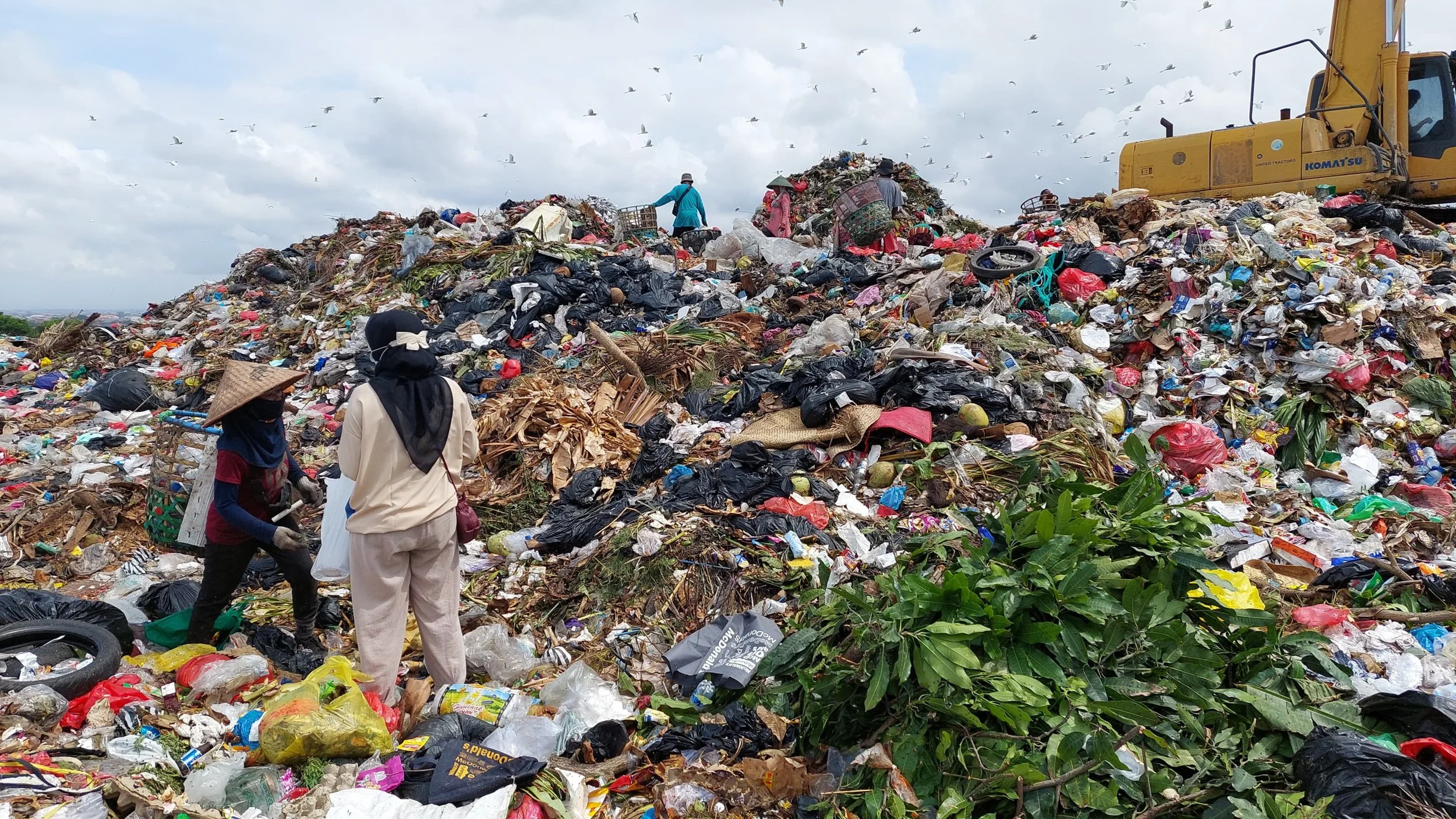Walking the mountain of waste: Lisen’s visits to Suwung Landfill and her ongoing ‘Learning Through Presence’
Bali, Indonesia - 2024In the southernmost outskirts of Denpasar, Bali, lies Suwung Landfill, a massive expanse of decomposing waste known to locals as TPA Suwung. Once a mangrove forest, it is now a mountain of trash towering over a deeply resilient community of waste sorters, often referred to with dignity by advocates as resource guardians, individuals who work at the frontline of our global waste crisis.
Lisen at Suwung Landfill with workers, a couple from another island of Indonesia, chatting while taking a break in the shade.
Recently, Lisen, founder of Sumati Group, walked this very mountain. She wasn’t there for research alone, though her work often weaves grounded observation with social transformation. She came, alongside a fellow European friend who had been supporting the local community for years, to listen, to learn, and to help. The two distributed food to families who spend their days salvaging recyclable materials for meager earnings, a gesture small in scope but profound in solidarity.
“You cannot truly understand a system until you place your feet in it and contribute hands-on, and getting to know those who live, and work, in it daily. It is one thing to write policy or build theory, but another to see a child eating and playing atop a hill of discarded waste, smelling and sensing the fumes from the decomposing materials and food.”
Suwung Landfill: Bali’s Silent Crisis
TPA Suwung was opened in the 1990s and spans approximately 32 hectares. Officially, the landfill was scheduled to close in 2013, but delays in waste infrastructure investment have kept it operating far beyond its intended lifespan. The mountain of waste grows daily - Bali produces an estimated 3,800 tons of solid waste per day, much of which still ends up here. The landfill is home, workplace, and playground for families who live on its edges.
Lisen witnessed toddlers navigating heaps of rubbish barefoot, their small hands sorting through decay, their laughter eerily rising from places where no child should have to play. Few of these children attend school regularly. For many, education is a distant dream compared to the immediacy of hunger or the need to contribute to the family income.
Learning by Doing:
The Sumati Approach
Lisen's visit is part of a deeper, longer arc of work. Since 2019, Sumati Group’s research plan has prioritized on-site learning, a commitment to understanding through “seeing and doing,” not just analyzing from afar. Lisen’s methodology, called The Sumati Concept, places lived experience, community dialogue, and embodied knowledge at the center of systems change.
This visit to Suwung is just one example of what Lisen calls “presence-based research.” Rather than extract data, she immerses herself in context, through conversation, walking, doing and witnessing. These encounters shape the policies, tools, and curricula Lisen is developing through Sumati Group for our future living labs and partners across the world.
From Witness to Action
The visit also raised an urgent question: What does reverent allyship look like in communities that face environmental and social marginalization?
“We don’t arrive as saviors. We arrive to ask, How can we honor the wisdom and grit of the people already surviving the impossible?” Lisen shared.
Lisen’s time at Suwung was brief, but the impact lingers.
“These are not ‘waste-pickers,’” she says firmly. “They are resource guardians. Custodians of the discarded. Children of a broken system. And they deserve more than our sympathy, they deserve structural change.”
In the end, walking the mountain of waste was not just about witnessing tragedy, it was about recognizing a frontier of hope, where resilience lives among ruins, and where change begins with listening.



